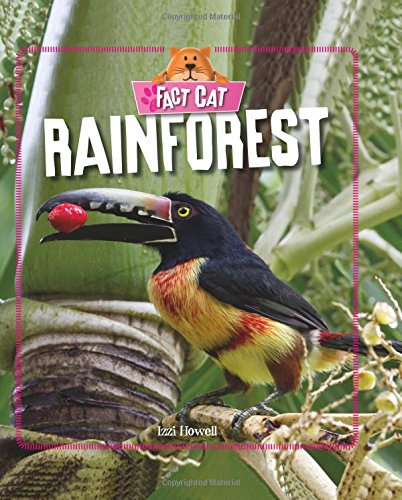
Rainforest (Fact Cat: Habitats)
Tropical rainforests represent the oldest major vegetation type still present on the terrestrial Earth. Like all vegetation, however, that of the rainforest continues to evolve and change, so modern tropical rainforests are not identical with rainforests of the geologic past.
Tropical rainforests today represent a treasure trove of biological heritage, and they also serve as sinks for more than 50 percent of all atmospheric carbon dioxide absorbed by plants annually.
They not only retain many primitive plant and animal species but also are communities that exhibit unparalleled biodiversity and a great variety of ecological interactions. The tropical rainforest of Africa was the habitat in which the ancestors of humans evolved, and it is where the nearest surviving human relatives—chimpanzees and gorillas—live still.
Rainforests are perhaps the most endangered habitat on earth. Each year, some 140,000 sq km of rainforests are destroyed. Rainforests are being felled for timber by logging companies and cleared by people for farming. The most endangered rainforests are those in West Africa, where human populations are doubling every 20 years, and in Central America and South-East Asia.
Although large areas of rainforest remain in Central Africa and South America, they, too, are disappearing at an alarming rate. Time is short if we are to save the remaining rainforests for future generations.
Deforestation of tropical rainforests has a global impact through species extinction, the loss of important ecosystem services and renewable resources, and the reduction of carbon sinks. However, this destruction can be slowed, stopped, and in some cases even reversed.
Rainforests are being cut mostly for economic reasons, though there are political and social motivations as well. A significant portion of deforestation is caused by poor farmers simply trying to eke out a living on marginal lands. Beyond conversion for subsistence agriculture, activities like logging, clearing for cattle pasture and commercial agriculture are sizable contributors to deforestation on a global scale. Agricultural fires typically used for land-clearing often spread outside cultivated areas and into degraded rainforest regions.
Poor farmers are simply trying to put food on the table for their families. A better approach to addressing the needs of the rural poor may be improving and intensifying currently existing agricultural projects and promoting alternative cultivation techniques—notably permaculture.
Permaculture adds a mix of crops to the farmer’s palette that both enables the farm to diversify his or her income stream and enhance degraded soils by restoring nutrients. An added benefit of such techniques is that they maintain forest systems, soils, and biological diversity at a far higher level than do conventional agricultural approaches.
Forests can be managed effectively without endangering rare species of plants and animals and without risking global environmental damage. Companies that harvest timber should not be allowed to “clear cut” large areas of forest and should be required to plant new trees after they cut old trees down. Governments should create large parks and reserves where hunting and logging are not allowed. As a world community, we must be careful not to destroy the resources that people will need in the future.
Many animals from the rainforests are brought to our country illegally. Parrots and iguanas, for example, are often imported illegally. We should not buy these animals, since that encourages other people to bring in more animals.
Recycle everything you can: newspapers, cans, glass bottles and jars, aluminum foil, motor oil, scrap metal, etc.
Live in a way that doesn’t hurt the environment – for example, don’t buy tropical woods. These are most often used for flooring or furniture. Mahogany, teak, and others are very common. Instead look for American woods such as oak, cherry, walnut, ash, and beech. Beautiful floors are now available made from bamboo – this is actually a fast-growing grass that is more environmentally friendly than cutting down huge old-growth trees.
Support and donate to organizations that purchase large tracts of rainforest land for preservation – most notable are the World Wildlife Fund and The Nature Conservancy.
Support the people who live in the rainforests in their efforts to save their environment. This can be done through purchasing crafts from rainforest inhabitants and from visiting rainforests yourself.
Perhaps the most important step to protecting our rainforests is falling in love with them. Educate yourself, your family and your friends about the beauty and remarkable importance of these ecosystems. Right now forest destruction is more profitable than forest protection. You can change that, and a great place to start is arming yourself with the facts.
If you have any information,questions, or feedback you would like to include in this webpage.
Please email momo19@naturekingdoms.com or leave your comments below.